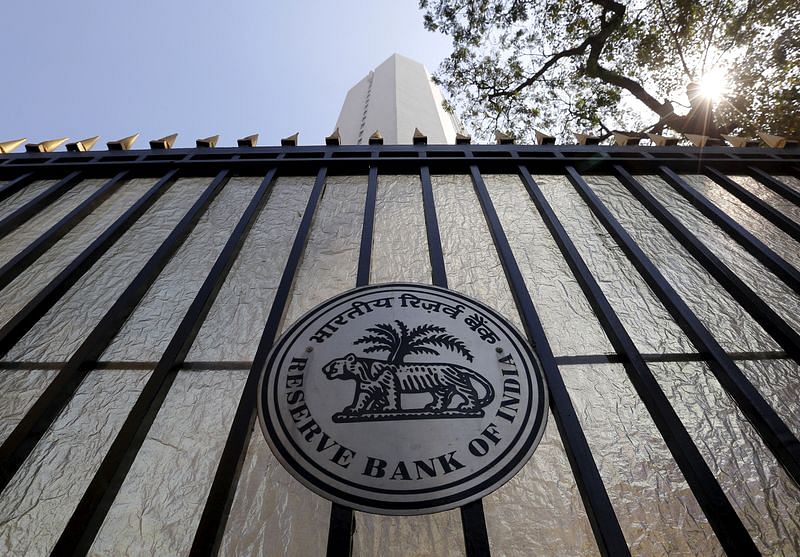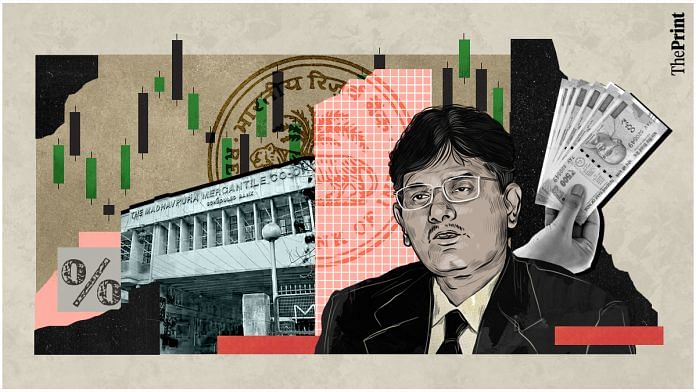Ahmedabad: In March 2001, even as the then finance-minister Yashwant Sinha presented a popular budget, the stock markets nose-dived 167 points. One Gujarati man was behind the crash, mentored by the notorious Harshad Mehta himself — Ketan Parekh.
This crash was a result of Parekh persistently pumping money into the Calcutta Stock Exchange through ‘badla’ securities, which could be bought using borrowed money.
Where did Parekh get this seemingly-unending flow of borrowed money?
Through security-free loans from the Ahmedabad-based Madhavpura Mercantile Cooperative Bank, among other institutions.
The cooperative bank is now defunct, its licence having been cancelled in 2012.
Former IAS officer Dilip Raval, who was also the liquidator of the bank, said a whopping 70 percent of its total finances had been extended to Parekh.
“Parekh was on the board of directors, and also had a lot of influence on the chairperson, who extended him loans without security,” Raval told ThePrint.
Why is this relevant now, more than two decades later?
Because Gujarat’s urban cooperative banks are once again in the midst of turmoil, with many of them being fined by the Reserve Bank of India (RBI) for lending to their own directors or their relatives.
The downfall of the Madhavpura Mercantile Cooperative Bank affected 264 other urban cooperative banks in Gujarat, before it went into liquidation. Fifty-one urban cooperatives have still not been paid, according to Raval.
While Madhavpura has returned Rs 300 crore to depositors, as much more remains to be paid, he said.
To get their affairs in order, Gujarat’s cooperative banks were brought under the direct and sole supervision of the RBI in 2020.
In the wake of the Ketan Parekh scam, the RBI formed rules and regulations that restricted banks from extending loans to the relatives of directors on the board, or for the board of directors to act as guarantors. The RBI has also updated these rules from time to time. Yet, the issue persists.
In November, an analysis by ThePrint of the 172 fines levied by the RBI this financial year, up to 24 November, found that nearly 75 percent were levied on cooperative banks.
Of these, one-fourth were for breaching rules relating to giving loans to related parties.
Of the fines levied for loans given to related parties, 74 percent were on cooperative banks based in Gujarat.
ThePrint spent days travelling through Gujarat to dig deeper into the state’s cooperative banks.
What it found was that homogenous, community-oriented bank boards, the ever-present and overwhelming influence of politics, and, to some extent, a lack of knowledge of RBI norms have rendered Gujarat’s cooperatives murky and opaque.
Social objective, political tools
Cooperatives can be described as people-centred enterprises owned, controlled and run by and for their members to realise their common economic, social, and cultural needs and aspirations, according to the Belgium-based NGO International Cooperative Alliance, which seeks to represent and serve cooperatives worldwide.
As the name suggests, cooperative banks are set up on a model of cooperation, with groups of people coming together and pooling capital to address certain goals — for example, in rural areas, farmers can come together to form a farming cooperative bank they can access for funds when they need it.
In Gujarat, a hold on urban cooperative banks has been seen as the first ladder on the path to political success. Many past and current stalwarts have emerged from these cooperatives.
The most popular name is that of Union Home Minister Amit Shah, who was elected the chairman of the Ahmedabad District Cooperative Bank in 2000 — according to his website, he was the youngest to hold the post.
Shah, who was also appointed as convener of the BJP’s National Co-operative Cell in 2001, continued to be on the board of directors until new RBI norms restricted elected representatives from being part of bank boards.
After the 2019 elections, the Modi government created a new ‘Ministry of Cooperation’ under Shah.
“Amit Shah was nothing till he became chairperson of an urban cooperative bank, and rose from there,” an official working in an urban cooperative bank said on the condition of anonymity.
This official added that, in order to succeed in politics, one has to provide certain “obligations”.
Another prominent example is the elder brother of Narhari Amin — who was once associated with the Congress but subsequently went to the BJP and is currently an MP from the Sabarmati constituency — who was the chairman of the Gujarat State Cooperative Union.
“Boards of cooperative banks are filled with political players,” he said. “(Mahatma) Gandhi envisioned a social cooperative, but Gujarat’s cooperatives have become political tools.”
Of the 38 urban cooperative banks that went bankrupt between 2001 and 2003 in Gujarat, 25 were controlled by politicians who allegedly “misused the funds to extend loans to friends and relatives”, said a 2003 India Today report.
An insider from the urban cooperative sector claimed that at least 40 out of 182 MLAs in Gujarat have a background of association with cooperatives.
“Politicians use urban and rural cooperative society as a means to nurture their constituents,” said another officer who previously worked in various urban cooperative banks.
“Not just nurture, but also oblige. Influence within cooperative banks immensely helps, as they push through for loans for their constituents, or friends even if they don’t meet the criteria for getting certain loans.”
Both the officials said politicians use their influence in the cooperative sector for gains in their career, and, at the same time, influence decisionmaking in boards of the cooperative banks.
“Even if the professional member of the board advises against a certain decision, the chairman can veto it, that’s how it works,” one of them explained.
Politics influences financial decisions of the cooperative banks to a great degree, A.R. Mankodi, who retired after serving on the board of various urban cooperatives in Gujarat, told ThePrint.
“How politics affects boards is that some might not take strong action even if it is advised by the professional in the board, especially when it comes to loan recovery,” Mankodi said. “Even after the officers push for it, banks end up not initiating action (against defaults) for 6-7 months.”
“Sometimes you have to give easy loans, against recommendation,” he added. “This could lead to an increase in non-performing assets.”
Reached for comment, the Opposition Congress in Gujarat was quick to point a finger of blame at the BJP, which has been in power in the state since 1995.
Gujarat State Congress Committee spokesperson Manish Doshi said the BJP had made “sahakari (cooperative), sarkari (government-related)”.
“They’re present in all cooperative institutes and societies, they misuse this machinery, they run agendas in the name of cooperatives, thus harming the objectives of any cooperative institute in Gujarat,” he added.
The BJP, however, dismissed allegations of political interference in the working of the banks. “No problem has been reported from urban cooperatives. They’re working fine,” said C.R. Patil, state president of the Gujarat BJP. “Nothing wrong is happening.”
Also Read: How Modi govt’s ordinance on cooperative banks can prevent PMC-like scams, protect depositors
Powers with a chairman
In 2021, the RBI introduced reforms in governance of urban cooperative banks, and said the chairperson of any board will have a fixed tenure of five years, and they can hold the position only thrice.
The RBI also mandated a cool-off period of three years prior to re-election. Before urban cooperative banks came under the purview of the RBI in 2020, they were governed by the Banking Regulation Act, 1949, and came under the purview of state governments.

The BRA recommended that a chairperson can serve continuously on the board for eight years at a time.
In Gujarat, however, the older rules and even the newer ones are being circumvented with the same people said to be switching between the posts of chairperson and vice-chairperson, in what has been described as ‘playing garba’.
“Chairpersons would play garba between the role of a chairperson then vice-chairperson and then chairperson again,” Mankodi said.
Another person called it the ‘Russian situation’, where much like what happened with Vladimir Putin (who served as PM for a time before returning as President), the power wielder would move out of the top job, but this had no bearing on the influence they could still exert on the organisation.
“A chairperson holding so much power is much like the bulldozers of politics,” said an official who previously worked in the state department administering the cooperative sector. “It affects the decisionmaking apparatus. In front of an all-powerful chairperson, CEO, MD, everyone is bulldozed.”
Chairpersons could then extend loans to relatives or friends using this power, and in a lot of instances without taking any security. As happened in the Ketan Parekh case.
The RBI is not oblivious to this situation, an official in the central bank told ThePrint, adding that “the biggest problem with the urban cooperative banks is that the boards are generally non-professional, sitting on the recommendation of a chairperson”.
Community & caste-based lending
Urban cooperatives are also very homogenous in their board compositions. Many banks are popularly known by the caste or community that runs them.
The cooperative Bank of Mehsana is called the ‘bank of Patels’, while the Rajkot Nagarik Sahakari Bank is referred to as ‘RSS ka bank’ in the city.
A lot of board members of banks share the same surname. “The caste-based sentiment in urban banks is really strong. It is a political arena,” an officer said.
Mankodi added that “in urban cooperatives, most loans are given on referral basis”. “If you know the directors, you’ll be given a loan. No walk-ins, it’s a community bank,” he said.
Loans to relatives by ‘ignorance’
There is also the view that the high incidence of fines on Gujarati cooperative banks for loans to relatives is due to ignorance about the rules.
“The RBI has recently changed the definition of relatives,” Jyotindra Mehta, president of the National Federation of Urban Cooperative Banks and Credit Societies, the apex body for promotion of cooperative banks and credit societies, told ThePrint.
“Earlier, it was not so, but now because of the complicated structure, banks commit a mistake. The rule against extending loans to relatives first came in the wake of the Madhavpura incident. Now, the RBI has hardened the parameters.”
Ignorance of rules is a factor cited by Mankodi as well as former IAS officer Raval in explaining why Gujarat has such a high incidence of penalties.
There was no answer, however, as to why this ignorance seemed to be more prevalent in Gujarat than in other states.
The latest RBI circular changing the scope of family and relatives dates back to 2021. The circular does introduce a certain amount of complexity.
Where the previous version included the siblings of the spouse of the director within the purview of a ‘relative’ who could not be granted a loan without the board’s approval, this provision was removed in 2021.
However, the 2021 notification adds a provision saying that any member of a Hindu Undivided Family (HUF) would classify as a relative. Under the law, brothers-in-law and sisters-in-law can be members of an HUF, which means they would be considered relatives, contrary to the other provision.
(Edited by Sunanda Ranjan)
Also Read: What are cooperatives & how a new ministry set up amid Modi govt reshuffle will help



